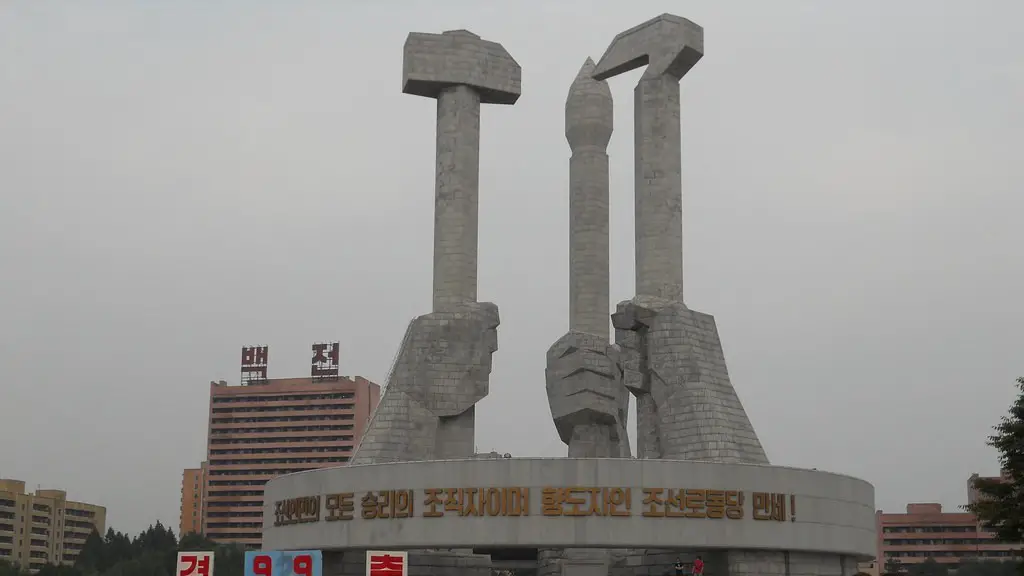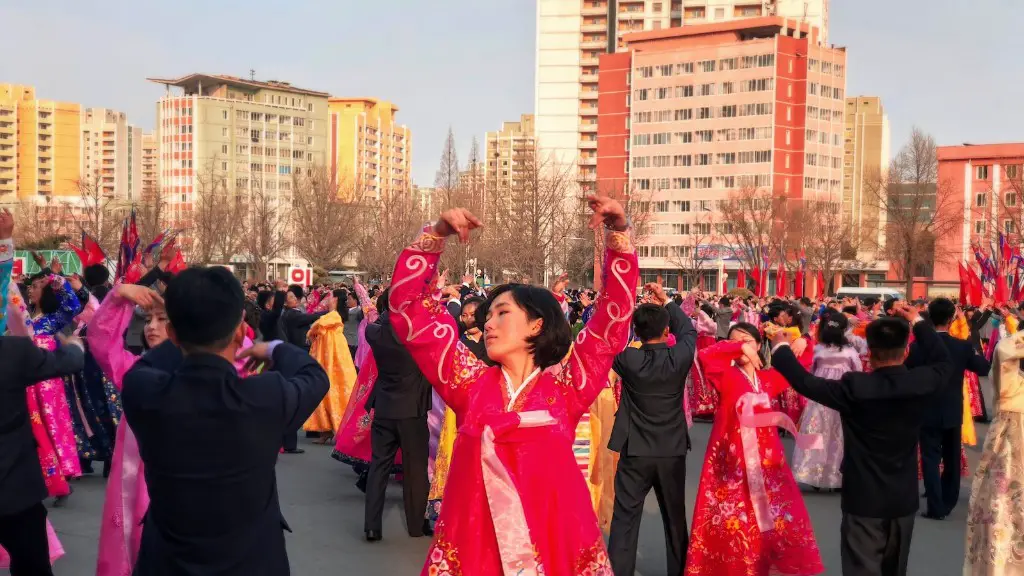Background Information
North Korea is ruled by a dynastic and authoritarian regime, led by the Kim family since the 1940s. The current leader is Kim Jong Un, who assumed power after the death of his father, Kim Jong Il, in 2011. Kim is a firm believer in the North Korean ideology of ‘juche’ which promotes self-reliance and state-dictated control over all aspects of daily life. He has adopted an increasingly nationalistic and hostile approach to foreign policy and is responsible for increasing international tension, especially regarding his country’s nuclear weapons program. The state also faces criticism for its human rights record, with reports of forced labor, prison-like labor camps and harsh punishment for offenders. Despite international sanctions and pressure from world leaders, Kim continues to lead North Korea as a totalitarian state.
Data and Perspectives
Kim rose to his position of General Secretary of the Workers’ Party of Korea in 2012, and was formally made the head of state in April 2012. He is the country’s Supreme Leader, with absolute control of the government, military and economy. He holds the title of Marshal, which grants him additional powers as Commander-in-Chief of the Armed Forces. Under his rule, North Korea has become an increasingly isolated nation. It has threatened to launch nuclear strikes against its enemies, including the United States, South Korea and Japan. This has led to increased international stress and sanctions placed on North Korea, as the international community seeks to contain the country’s nuclear ambitions.
The Kim regime is also marked by heavy censorship and repression of citizens’ rights. It maintains absolute control over the media and access to information, including blocking internet access for the public and limiting access to foreign media outlets. It also has a powerful internal security apparatus, which controls citizens’ movements and limits access to certain areas of the country. In addition, the country has maintained one of the most oppressive systems of labor camps in the world, in which prisoners are subjected to extreme conditions and mistreatment.
Despite these harsh realities, Kim has managed to retain a grip on power. This partly stems from his use of loyalty-based politics and a carefully crafted cult of personality, which portrays him as a benevolent, heroic and almighty leader. He has a powerful and loyal base of supporters, who overlook his regime’s human rights abuses and support his leadership as they fear the potential return of Japanese rule.
Expert Perspectives
Experts agree that Kim’s rule has led to increased international tension and worsened the human rights situation in North Korea. David Maxwell, a retired US Army Colonel and senior fellow at the Foundation for Defense of Democracies, has said that Kim’s regime is a “typical Stalinist police state where basic human rights are violated in a very systematic way”. He and other experts also point to his leadership as having further isolated North Korea from the international community, leading to increasing economic hardship for citizens.
The United Nations has condemned Kim for his violations of human rights. Human Rights Watch has also highlighted the Kim regime’s “widespread and serious” abuses of its own citizens, including torture, forced labor, arbitrary detention and violations of the right to freedom of religion and expression. This criticism has also extended to his nuclear ambitions and increasing belligerence towards other nations, which has led to UN-imposed sanctions on North Korea and strained relations with its neighbors.
Analysis and Insights
Kim Jong Un has managed to remain in power despite the increasing international condemnation of his regime. He has done this largely through the use of a carefully crafted personality cult and by rewarding loyalty among his supporters. He has also managed to maintain a firm grip on power in the face of international sanctions and pressure, due in part to the loyalty of his citizens and the strength of his control over the government, military and economy.
At the same time, it is clear that his rule has led to increased international tension and worsened the human rights situation in North Korea. His nuclear ambitions and increasingly belligerent rhetoric towards other countries have led to widespread condemnation and even strengthened international sanctions. His tightening grip on the media and access to information has also led to significant restrictions on freedom of information and expression within the country.
Impact on the International Community
Kim’s rule has had a profound impact on the international community. He has managed to maintain a firm grip on power despite increasing international pressure and condemnations of his policies. This has led to an increased sense of instability in the region, with fears of potential military conflict stemming from his nuclear ambitions. This has led to further sanctions against North Korea, resulting in decreased economic relations with other countries.
The human rights abuses of his regime are also a cause of international concern. Human rights organizations have condemned the government for its brutal treatment of citizens, leading to even more pressure from the international community. This pressure has thus far been unsuccessful in curbing Kim’s power, however, as he is able to shrug it off with relative ease thanks to the loyalty of his citizens and his control over the state.
North Korean Relations With China
Kim’s rule has had a profound impact on North Korea’s relationship with China, its closest ally. Since Kim’s rise to power, the relationship between the two countries has become increasingly strained. China has been increasingly critical of Kim’s nuclear ambitions and has spoken out against North Korea’s human rights abuses.
In response, North Korea has sought to increase its isolation from China, resulting in a weakening of the two countries’ relationship. China has responded by increasing economic sanctions against North Korea and placing restrictions on the movement of North Korean citizens travelling in and out of China. This has resulted in decreased economic investment and trade between the two countries, causing further hardships in North Korea.
International Sanctions and Penalties
Kim’s rule has resulted in the imposition of several international sanctions and penalties by the United Nations and other countries. This includes sanctions that target the government, military and economy, as well as restrictions on weapons imports and exports, and even the freezing of North Korean assets abroad. These sanctions are designed to limit Kim’s ability to finance his nuclear ambitions and to prevent his regime from gaining access to weapons of mass destruction.
The sanctions are having an impact on North Korea, as the country is facing increasing economic hardship due to the restrictions. However, Kim is able to weather the storms of international pressure, largely thanks to his control over the government and military.
North Korean Propaganda
Kim’s authoritarian rule of North Korea has been marked by widespread use of propaganda. The state-controlled media portrays Kim as an all-powerful and benevolent leader who is wise and benevolent and has the citizens’ best interests at heart. This propaganda is carefully crafted to create an image of invincibility and control, and also to discourage potential dissidents by reinforcing the loyalty of citizens to Kim and the regime.
The North Korean propaganda machine has been successfully able to create a sense of fear and admiration towards Kim, and to shape public opinion within the country. This has allowed Kim to maintain his grip on power, despite his increasing unpopularity with the international community.


